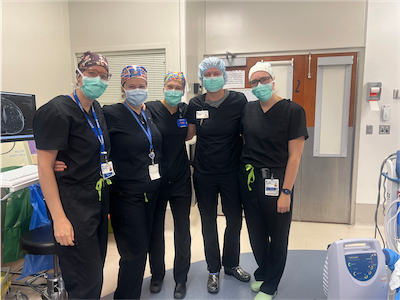Duke's nationally recognized cancer treatment programs combine cutting-edge research with compassionate care to treat more than 7,000 new cancer patients each year. This volume gives our team the extensive experience that yields better results.
Learn details about patient care in our sections:
Regional Therapies
Hepatic arterial infusion pump (HAIP) therapy
A pump is surgically implanted in the abdominal wall and a catheter is used to deliver doses of chemotherapy hundreds of times higher than systemic chemotherapy. Drugs are delivered through the hepatic artery, which directly feeds tumors in the liver. It is given in combination with systemic chemotherapy but it does not increase the side effects. Hepatic artery infusion is used to treat metastatic colorectal cancer to the liver as well as primary liver cancer (intrahepatic cholangiocarcinoma) that cannot be surgically removed.
Read more about HAIP therapy at Duke
Read more about other liver directed therapy, including HAIP, for liver cancers
Percutaneous hepatic perfusion (PHP)
Duke is a well-established referral center for patients with ocular melanoma. For patients with metastatic ocular melanoma to the liver, we offer liver-directed high dose chemotherapy with a minimally invasive procedure known as percutaneous hepatic perfusion (PHP). Duke was involved in the clinical trials leading to the therapy’s FDA approval- we now have a clinical program.
Surgical cytoreduction and hyperthermic intraperitoneal chemotherapy (CRS/HIPEC)
Duke Surgery has a well-established program for managing patients with peritoneal surface malignancies (PSMs). We have offered—in appropriate patients with peritoneal carcinomatosis—surgical cytoreduction and hyperthermic intraperitoneal chemotherapy (CRS/HIPEC) since 2008. Dr. Blazer initiated and has led this program since that time and we have treated hundreds of patients over that time period. In addition, during that time, we have been involved in novel clinical trials for patients with PSMs, some of which are actively accruing. These trials have provided platforms for excellent collaborations with our colleagues in medical oncology and gynecologic oncology—providers who also help manage these patients.
Read more about CRS/HIPEC therapy
Patient Care Resources
- Duke Cancer Institute is one of only 40 centers in the country designated by the National Cancer Institute (NCI) as a “comprehensive cancer center”.
- Duke Cancer Patient Support Program offers continued support from the time of diagnosis, through treatment, recovery, and survival, and also through the circumstances surrounding end of life.
- Duke Cancer Patient Education uses a multimedia approach to assist cancer patients and their families in understanding options, making decisions, managing the effects of cancer and its treatment, and finding meaning in the experience.



